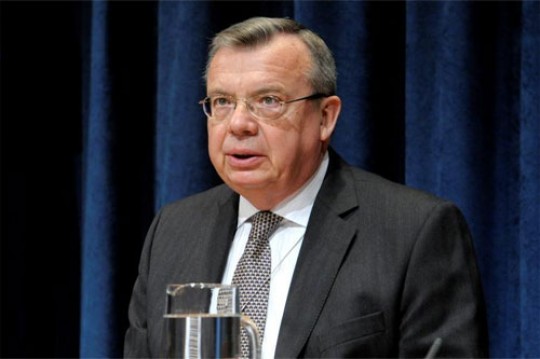Afghanistan and regional partners launch UN plan to boost counter-narcotics efforts
Afghanistan and regional partners launch UN plan to boost counter-narcotics efforts
 UNODC Executive Director Yury Fedotov. UN Photo/Evan Schneider
UNODC Executive Director Yury Fedotov. UN Photo/Evan Schneider
Senior officials from Afghanistan and neighbouring countries today launched a United Nations plan to strengthen counter-narcotics efforts and boost regional stability.
The launch of the UN Office on Drugs and Crime (UNODC) 2011- 2014 Regional Programme follows Monday’s International Conference on Afghanistan, held in the German city of Bonn, that discussed the future course for the country after the 2014 handover of power to the Government.
“Because the coming years are absolutely crucial for Afghanistan’s future, we must produce a response based on shared responsibility and concrete action,” said UNODC Executive Director Yury Fedotov.
The agreement between Afghanistan, Iran, Kazakhstan, Kyrgyzstan, Pakistan, Tajikistan, Turkmenistan and Uzbekistan to cement cooperation in the field of counter-narcotics, especially in information-sharing, is unprecedented, according to Mr. Fedotov.
He added that it is a measure of the trust built up by his agency over the past few years that parties have come together in Vienna, putting aside their suspicions.
The regional programme focuses largely on counter-narcotics and the rule of law to respond effectively to drug trafficking and organized crime. Building on past successes, examples of future work may include training counter-narcotics law enforcement officials; conducting joint raids, drug seizures and border patrols; and tackling cross-border illicit money flows.
Last week Mr. Fedotov had praised counter-narcotics ministers from Afghanistan, Pakistan and Iran on a new agreement that will increase the exchange of information to tackle drug trafficking in the region.
Afghanistan provides 90 per cent of the world’s opium, most of which is shipped through Iran and Pakistan. Since 2007, the three countries have been involved in the UNODC-sponsored Triangular Initiative to coordinate their efforts to combat trafficking.
“Now is the time for a more result-oriented response to the challenge of drugs, which is based on concrete actions and shared responsibilities,” he stated during a two-day visit to Afghanistan last week.
Along with the regional plan launched today, UNODC will support Afghanistan through a new country programme for 2012-2014, providing alternative livelihoods for opium poppy farmers, expanded health care, drug demand reduction and HIV prevention.
The agency’s Afghan Opium Survey 2011 showed that Afghanistan witnessed a sharp increase in opium production this year, higher prices for the crop and a flourishing drugs trade that continued to fuel insecurity.
###
> United Nations (UN).
 The United Nations was established on 24 October 1945 by 51 countries committed to preserving peace through international cooperation and collective security. Today, nearly every nation in the world belongs to the UN: membership totals 192 countries.
The United Nations was established on 24 October 1945 by 51 countries committed to preserving peace through international cooperation and collective security. Today, nearly every nation in the world belongs to the UN: membership totals 192 countries.
When States become Members of the United Nations, they agree to accept the obligations of the UN Charter, an international treaty that sets out basic principles of international relations. According to the Charter, the UN has four purposes:
- to maintain international peace and security;
- to develop friendly relations among nations;
- to cooperate in solving international problems and in promoting respect for human rights;
- and to be a centre for harmonizing the actions of nations.
###
* The above story is adapted from materials provided by United Nations (UN)
** More information at United Nations (UN)




















